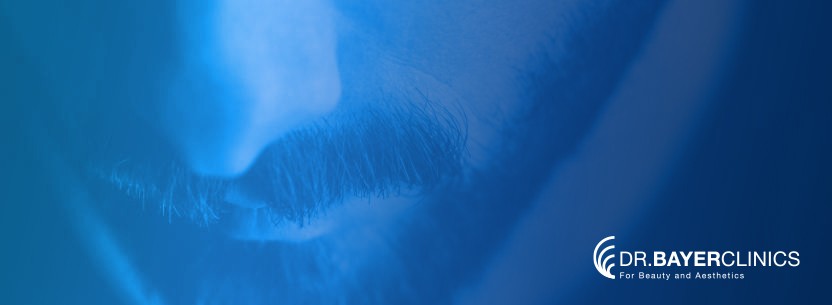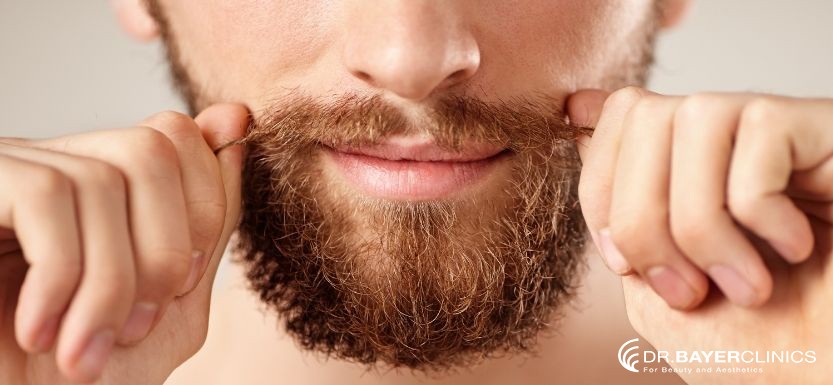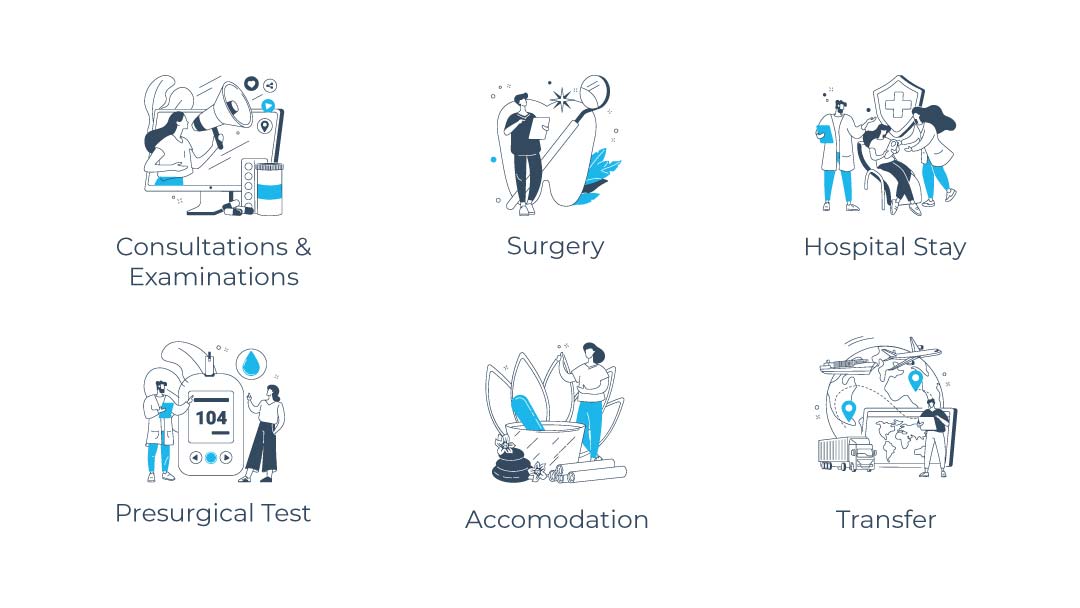quick facts
| language | turkish (dr. yetkin bayer clinics have native european speakers) |
| visa | is not required for a trip of at least 30 days per visit |
| time difference with europe | 3 hours |
| time difference with the usa | 8 hours |
| capital | ankara |
| medical tourism centers | istanbul, izmir, antalya |
| popular regions | alanya, kemer, marmaris, fethiye, bodrum |
| best period for the trip | february-september |
| currency | turkish lira (euro, usd, pound are also accepted.) |
what is mustache transplant ?
hair transplantation is remarkably similar to mustache and beard transplant. nevertheless, when it comes to the face, hair transplant must be done with greater care and attention to detail. with local anesthetic, the mustache transplantation is conducted. when compared to hair transplantation, it requires far less time, with 2 to 3 hours to complete.
the quantity of grafts to be implanted is determined initially. it’s planned how the mustaches will look when they’ve been planted. the surgery begins after the donor site has been identified. separately, the desired quantity of grafts is retrieved from the source location. the gathered hair follicles are then let dry before being transplanted.
channels are created in the mustache region in the places where the roots will be put. transplants are then inserted in the channels that have been created. the donor area is wrapped in bandages at the end of the operation.
can you get a mustache transplant?
hair transplantation and mustache transplantation are surprisingly close procedures. however, because it will take place on the face, it is a much more delicate treatment. to avoid scarring or unfavorable effects, meticulous labor is required. of course, for a location that is this delicate, there are some requirements.
first of all, the greatest option for a donor location is usually the neck. if you don’t have sufficient donor hair in the neck area, arms or hairy legs can also be used to implant a moustache. based on the plainness of the moustache area, 300 to 500 follicles are required. as a result, you should have the required amount of hair in your donor area.
in addition, for people over the age of 20, a moustache transplant is a viable choice. finally, the individual must be in excellent health and free of any skin disorders that could prevent the hair transplant from being successful.
| operation |
mustache transplant
|
| duration | 5-8 hours |
| anesthesia | local |
| healing time | 10 days |
| back to work | 1 week |
| scars |
almost no scarring
|
| pain | not painful |
| techniques |
sapphire fue, dhi choi techniques
|
| age limit | 25 to 75 |
| permanent | yes |
causes of mustache loss
- ringworm disease: the hairs on the lips shed at certain intervals. nowadays, treatment methods of ringworm disease are quite high.
- mustache sores: deep sores in this area are likely to harm the hair follicles. failure to treat deep wounds in a timely manner may damage the patient’s health and hair follicles in the mustache area.
- mustache habit: some people do not notice, but there are various tics. frequent repetition of these movements may damage the hair follicles over time.
- inflammation and infections: inflammation in the upper region of the lip causes spillage in the relevant area in the future. in addition, the high number of pimples may affect hair roots negatively. the hair follicles may disappear without treatment.
- psoriasis: psoriasis is another disease that damages mustache and beard roots. in some cases, hair follicles on the lips get seriously damaged.
mustache transplant procedure
the dhi method is the best option to perform a mustache transplant. in the sense of application, there is no difference between hair transplantation. what is essential in a mustache transplant is the successful postoperative appearance. mustache hair grows close to the skin. therefore the right angle is crucial to obtain a natural appearance. it is necessary to wait between 4 and 6 months for a complete result.
a mustache transplant is a better option for those who are 20 years and older. this transplantation is very similar to hair transplantation. however, it is a much more sensitive procedure since it will take place in the face area. meticulous work is essential to prevent possible scarring or undesirable complications.
the neck region is generally the best option for a donor site. however, if you do not have enough donor hair in the neck region, arm or leg hair can also be suitable for a mustache transplant. between 300 and 500 hair follicles are sufficient depending on the sparse mustache area.
you leave the hospital with a bandage covering the operation area. you should change the bandage from time to time for three days. during this period, you should not wash your face. the recovery process after transplant lasts about ten days. in this process, the hair roots are crusted. this crusting begins to disappear slowly with the first wash on the 3rd day. then, you can feel the comfort and development of the roots in the transplant area.
you can shorten your mustache with scissors after 15 days. however, be careful while using scissors as the follicles may not hold on to the skin yet. shedding may occur 2-3 weeks after the operation. after 2 or 3 months your new mustache begins to grow again and continues to grow in the normal course. after six months of planting the mustache, the roots completely hold on to the skin. as a result, it continues to extend in the normal cycle.
what are the risks and side effects of mustache transplant?
mustache transplantation, like any other hair transplant procedure, carries a range of risks and side effects, such as:
- bleeding: as among the most main symptoms of a moustache treatment, slight bleeding occurs at both the donor and recipient sites. this is quickly done by adjusting light touch to the wound site. it is also advised to avoid cigarettes, drinking, and blood thinners, as these can all interrupt blood circulation.
- infection or reaction
- bloating, scarring, and rashes: you may notice mild swelling in the recipient site, and this is absolutely natural and will go away in 2 days at most. it is a short-term situation that happens in nearly all the scenarios of hair transplant surgery.
- itchiness: one more main symptom of moustache transplantation is the wish to rub the scar tissue and slices that form on the recipient site. it is critical to oppose the itchiness impulse because it can disrupt the recovery process.
mustache transplant-recovery timeline
genetic factors, laser treatment, injuries, injuries, or operation are all possible reasons for facial loss of hair. the objectives of mustache transplantation can vary from a complete restoration to a slight filling in of a small area. in addition, wounds can indeed be hidden by facial cosmetic surgery.
the procedure for a mustache transplant is closely related to that for a hair transplant, and the implanted hair grows and also can be removed like most other facial hair. with all of its positive sides, patients wonder how fast their mustaches will grow after the procedure and what they should do to keep the recipient and the donor area healthy. individuals should keep in mind that mustache transplantation is much more of an adventure than a simple fix, and the transplanted hairs will need time to adjust.
every person is different, thus there will always be differences in mustache growth. nonetheless, the following is a comprehensive list of the phases you might expect at various stages:
recovery timeline after surgery:
- the transferred area will appear quite genuine after one week.
- the donor area recovers quickly as well; in 15 days, you will have the same look as before the surgery.
- the implanted hairs should be stable and developing within 3 to 4 months.
- patients can observe the majority of the end result after 6 months, and intense and mustache growth can be seen after 1 to 1.5 years.
what to expect after a mustache transplant:
the patient’s perspective has an impact on the development of a mustache transplant. as a result, a few actions are needed in order to achieve the best possible scenario. while your doctor and his or her team of professionals will go over anything in details with you, here are a few mustache transplant surgery strategies:
- following the mustache transplantation, your operator will provide you with a list of instructions to aid in the process of recovery and achieve optimal results. every last one of these instructions must be strictly followed.
- you must abstain from drinking for at least 14 days before and after your mustache transplant surgery. avoiding alcohol will assist to reduce edema. if you consume alcohol, your veins dilate, leaving your system at danger of edema. alcohol thins the blood, and as a result, their capacity to congeal will be reduced, which may result in excessive loss of blood.
- water is an important part of your body’s wound healing, and it is hugely reliant on it. water is required for the removal of waste and the transmission of nutrients from one body component to another. vitamins must flow to diverse parts of your body to speed up healing. every day, you need to take a minimum of 8 glasses of water.
- smoking reduces blood flow to your mustache area and might induce blood vessel tightness. the mustache’s growth may be inhibited as a result of this; so, you should avoid cigarettes.
- during up to one week into the transplant surgery, avoid contacting the transferred place. this will aid in the prevention of infections.
how much does mustache transplant cost?
men who desire to get a bushy appearance on their mustache area may get this surgery to achieve their goals. furthermore, to achieve their goals, there are plenty of clinics worldwide. nevertheless, each and every clinic has their own pricing list for the surgeries.
so, here is the list of pricing for mustache transplant surgery in several countries.
usa: depending on your needs, the cost of a mustache transplant in the united states ranges from $4000 to $10000. if additional operations are required, you may be charged a price.
spain: the average cost of a mustache transplant in spain is around 7250 euros, though this varies depending on the doctor’s experience, clinic, and so on.
the netherlands: expect to pay at least €5750 for a mustache transplant if you choose the netherlands.
france: the transplantation operation will cost between €3000 and €8000 in france.
uk: clinics in the united kingdom do this operation for an average of £5000.
germany: in order to travel to germany, you must have at least €4500.
how much does mustache transplant cost in istanbul, turkey ?
it is well-known that turkey is one of the cheapest countries in the world when it comes to hair transplants and this principle also applies to mustache transplants. this is why a beard transplant in turkey can be obtained for less than $ 2,000 for patients who need a small number of grafts, however, the price can go higher based on how many grafts are needed.
it should also be noted that this price refers only to the cost of the procedure and no other additional costs which should also be taken into consideration.
mustache transplant in istanbul, antalya or izmir
mustache transplant in istanbul, with beard and mustache transplant in istanbul, you have the option to customize your appearance. beard and mustache transplant is appropriate for men over the age of 22 who are experiencing problems with non-growth of beard and moustache hair or the presence of empty spaces, or who simply want a higher density.
mustache transplant in antalya a full beard transplant can take up to eight hours, while growing a full beard can take several weeks. the road to recovery is usually problem-free and pain free. a beard transplant can be done in a single eight-hour day. for this, the doctors administer oral sedation as well as local anesthesia around the head to their patients.
mustache transplant in izmir throughout history, men’s mustaches and beards have been indispensable accessories. nowadays, baldness aesthetic methods developed concurrently with the solution were discovered in the corner. beard and mustache transplantation is used when there is no beard or mustache growth in a particular area due to injury, burns, or other factors.
there are so many options in front of you, but the best among these cities is of course istanbul. it has made a difference to other cities with the number of doctors and the success of doctors.
all inclusive mustache transplant package:
- accommodation (3 nights stay in a 4-star hotel)
- vip transfers (private car. from the hospital to the hotel, then to the hospital, and back)
- translator service if needed
- painless local anesthesia
- microfue maximum density pre-operation haircut
- prp treatment medications
- post-operative care essentials, such as shampoo, lotion, special hat, neck pillow, pain killers, aspirin, antibiotics, etc.
- prp therapy to stimulate better hair growth.
why is a mustache transplant in turkey cheap?
turkey is the most popular country in all kinds of hair transplantation and plastic surgery, and it is easier to receive a moustache transplant in turkey, at a much cheaper cost.
because:
- one of the big factors to a cheaper cost, turkey supports the domestic manufacturing of any goods and products over importing, as a result, it eliminates shipping, logistics, and customs costs from the final pricing stage. this same concept contributes to low health care costs and surgery prices in turkey.
- in the united states or the united kingdom and europe, average salaries play a major part in what can truly be called ‘low cost’ here in turkey, and not only income, but the cost of living is higher.
and that can answer why a mustache transplant is cheaper in turkey. it’s a matter of understanding how the world works. the low prices have everything to do with the economy and nothing to do with’ the quality’.
how to choose the best clinic for a mustache transplant?
https://www.youtube.com/watch?v=fimjs-gwwoy
if you are already coming to turkey, you may also go to the best clinics to get your mustache transplants, a significant consideration for choosing the best clinic is that first, you have to look at their website online and read the customer review and, secondly, you have to know the expertise of your physician who conducts your procedure.
and we provide you some of the main factors, to help you choosing istanbul turkey’s best clinic for hair transplant:
- experience
- dedications and commitment
- consistent results
- affordable hair transplant
a high moustache transplant cost does not guarantee you the best results, you must know hair transplantation restoration procedures and costs and know what applies to you.
and do not go for fake advertisements-make research by yourself. find the center with affordable mustache transplant over the internet and then enquire personally.
mustache transplant reviews in turkey
[/av_textblock] [/av_slide] [/av_slide] [/av_slide] [/av_slide] [/av_slide] [/av_slideshow]faq
is a mustache transplant permanent and worth it?
a mustache transplant is the most lasting and natural-looking alternative for people who have lost their mustaches. similarly to how hair transplants provide permanent hair remedies for bald heads, mustache transplants can provide long-term answers for patchy mustaches. if new hair falls out initially, this indicates that the follicle has effectively implanted. from now on, fresh hair will sprout from these follicles and will resemble real hair.
is a mustache transplant painful?
the operation is painless thanks to the local anesthetic used during mustache transplantation. because the fue technology is employed, mustache transplanting is a fairly comfortable procedure. follicles harvested from a denser donor area are implanted in the mustache area using this procedure. nevertheless, to not have any kind of pain before, during, and after the surgery, you should follow the instructions of your surgeon.
what is the success rate of mustache transplant?
if we define success as graft survival, facial hair transplants outperform hair transplant grafts put in the balding scalp. the technical delicacy with which the grafts are produced, stored, and handled during insertion is the most important factor of survival of hair transplant grafts to the face or elsewhere. with adequate attention to these factors, nearly all of the grafts will survive and continue to create living hair for the rest of their lives.
is mustache transplant safe?
yes, getting a mustache transplant is safe. however, like with most procedures, there is a chance of infection and minor bleeding, but these are uncommon with hair transplanting. hair follicles might get infected and irritated on occasion. scarring at the source location is also possible, though most hair will cover that area over time.
does mustache transplant leave scars?
there is not a concrete answer for this question but generally all kinds of hair transplants leave scars. nevertheless, if you get a fue mustache transplant, no strip is removed; instead, each follicle is plucked with a tiny round surgical punch. so, the risk of permanent scarring is reduced and diminished with the technique. but, still, your surgeon must be a skillful one.
references:
https://www.wsj.com/articles/sb10001424127887324474004578446930711155800
https://www.ishrs-htforum.org/content/25/4/133.2
[/av_textblock]















